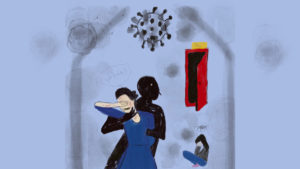Domestic violence against women during the Covid-19 crisis is a major issue with which women’s rights activists are having concerns.

Women’s rights activists fear that instances of domestic violence could see a sharp rise due to home confinement orders during the Covid-19 pandemic, with many trapped at home with their abusers. Activists have called for extra attention and awareness of the issue in order to help reduce the rate during these unprecedented times.
Sar Sineth, the deputy of the Legal Protection Department at the Ministry of Women’s Affairs, has said that domestic abuse occurs in four forms: physical, sexual, emotional, and economic. These behaviors are exhibited by abusers to take control of or dominate another person in the family.
The Law on the Prevention of Domestic Violence and The Protection of Victim passed in 2005 was developed by the Ministry of Women’s Affairs and covers the violence that happens or could happen towards members of a household and puts measures in place to help prevent future violence and protect victims.
Seng Reasey, executive director of SILAKA, a non-governmental organization promoting women’s empowerment and good governance, said factors contributing to domestic violence during the pandemic include stress of job loss and financial issues, which increase the rate of the violence against women and children in the household. In addition, many women cannot go out and have lost contact with their friends to whom they turned to for help.
Stay-at-home women have traditionally been in charge of household duties in Cambodia, with the burden growing with children staying home due to temporary school closures. For women who work from home, a combination of working duties, maintaining the household, and caring for children can be overwhelming and can affect women’s mental health.
One of the main factors of domestic abuse is financial problems, particularly within a family with a stay-at-home wife and a working husband. The husband might reduce or minimize the family’s expenses, mentioning the difficulty of generating income due to Covid-19.
Reasey added that perpetrators may also take advantage of the current crisis to wield their power over their family, and not permit any assistance from the outside.
Yim Sotheary, a psychotherapist and conflict-resolution and peace consultant, shared some measures people can take in order to protect themselves from violence, in particular, during this crisis. She encourages people to learn how to manage their emotions and to be self-conscious of their anger by taking a deep breath, peacefully walking away, and reducing anger with the assistance of music, exercise, or a shower.
She added that people should research how to eliminate anger or stress, if possible. If the situation is unable to be avoided, you should try to remain calm while communicating in non-combative language, or try to defuse the situation by watching TV or playing sports to relieve frustration.
Sineth stated that the Ministry of Women’s Affairs will continue its support services and will facilitate the process of providing relevant services to the victims through various measures.
According to the World Health Organization, one out of three women worldwide has suffered physical and/or sexual violence by their partners or abusers in their lifetime. Research conducted in the Asian-Pacific area shows violence against women occurs at an even higher rate in the region. Also, the rate of violence against women tends to increase during times of crisis.
Anti-domestic violence specialists encourage people to avoid violence and to try to flee conflict to a safer area such as a police station, commune office, or safe house. Victims are able to report to the local authorities through a hotline, which is available on the Ministry of Women’s Affairs Facebook page, or other relevant organizations.
Activists have also highlighted that domestic abuse is not only a personal issue, but it is also an illegal act. Every individual has the right to report violence to pursue justice for themselves and other victims.



